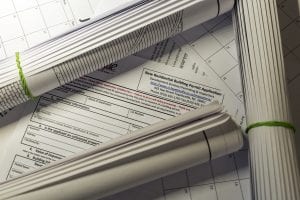Building Permits 101
 Are you thinking about building a home or adding an addition? Maybe you’re building a commercial project for business. Permitting and inspections are an important consideration before you build. This blog will take you through some frequently asked questions to help you avoid making any costly mistakes.
Are you thinking about building a home or adding an addition? Maybe you’re building a commercial project for business. Permitting and inspections are an important consideration before you build. This blog will take you through some frequently asked questions to help you avoid making any costly mistakes.
Do I even need a permit?
Some typical home improvement projects that require permits include:
- Additions, remodeling, repairs, replacements and upgrades, anything that will require construction.
- Detached garages, sheds larger than 12 feet, platforms, green houses. These are known as accessory structures.
- Any project that involves structural support changes (roof or floor), load bearing walls, screened porches, decks, and balcony projects.
- You’ll need a mechanical permit for replacing a duct, ventilation, heating and air conditioning equipment.
- You’ll need a plumbing permit for running lines or replacing shower and/or bath tub enclosures.
- Electrical permits cover projects that require electrical wiring such as ceiling fans, electrical outlets and overhead lighting.
- Landscape and irrigation system installation
- Retaining walls that stand over four feet in height.
- Sky lights
- Re-roofing permits are required if there is a replacement equal to greater than 100 square feet of the roof covering.
- Exterior siding
- Construction of new fences, replacement of existing fences with fences of a different design or material or additions to existing fences require a Zoning Permit.
Why is it important to get a permit for your project?
The permit process is in place to ensure the structural integrity of the project in order to add the basic protection for life and safety issues.
If a permit is issued after the start or completion of the project, the permit will cost double the original amount.
If you’ve added square footage to a home without the appropriate permitting and inspection, you will be required to get it permitted and inspected before you close on the house resale. In some cases, it may require the finished work to be torn out so that the rough in and framing can be properly inspected. This can be a costly mistake that can all be avoided by attaining a permit prior to the start of the project.
How often do inspections occur?
City inspectors will inspect your work during each phase of construction before work is continued. Specifically, they will inspect:
- Footing inspection: After trenches are excavated, grade stakes installed, reinforcing steels and supports in place and tied.
- Under slab inspection: After all materials and equipment to be concealed by the concrete slab are complete.
- Foundation inspection: After all foundation supports are installed.
- Rough-in inspection: When all building framing and parts of the electrical, plumbing, fire protection, and HVAC systems that will be hidden from view in the finished building have been placed.
- Building framing inspection: After the roof, wall ceiling, and floor framing is in place.
- Insulation inspection: Must be inspected before any wall or ceiling covering is applied.
- Final inspection: After completion.
How much does a building permit cost?
In Fayetteville the cost of the building permit is based on the square footage of the house. This fee is payable when you pick up the permit.
The fee covers each trade identified in the project, such as building, plumbing, mechanical, electrical, and insulation. The fees charged include only the trade permits that are part of the project.
What information do I need to apply for a permit?
Along with the completed application, you need to provide two complete sets of project construction drawings, which include:
- Cover page with the address of the project
- Appendix B – Building Code Summary
- Site Plan of the entire site
- Building construction plans
- Electrical plans
- Mechanical plans
- Plumbing plans
- Workers Compensation Form
- Lien Agent Certificate, if the project is $30,000 or more
- Energy ComCheck for Commercial or ResCheck for Residential
Permits are issued at City Hall Permit Counter desk located at 433 Hay Street, City Hall, First Floor, Fayetteville, NC 28301. Hours are from 8:00 a.m. to 4:30 p.m.
